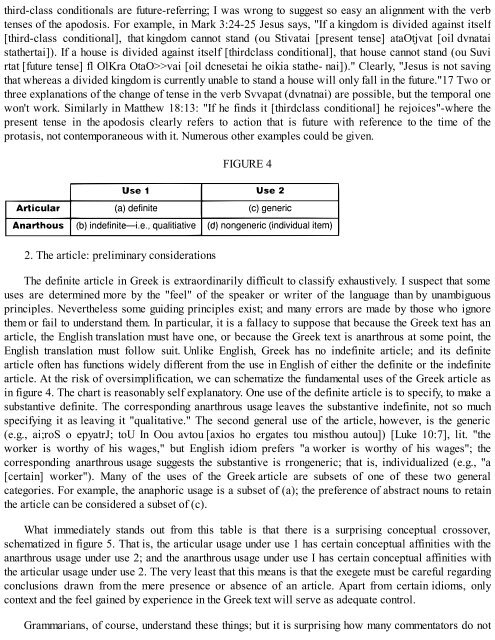Exegetical Fallacies - D. A. Carson
Exegetical Fallacies - D. A. Carson
Exegetical Fallacies - D. A. Carson
Create successful ePaper yourself
Turn your PDF publications into a flip-book with our unique Google optimized e-Paper software.
third-class conditionals are future-referring; I was wrong to suggest so easy an alignment with the verb<br />
tenses of the apodosis. For example, in Mark 3:24-25 Jesus says, "If a kingdom is divided against itself<br />
[third-class conditional], that kingdom cannot stand (ou Stivatai [present tense] ataOtjvat [oil dvnatai<br />
stathertai]). If a house is divided against itself [thirdclass conditional], that house cannot stand (ou Suvi<br />
rtat [future tense] fl OlKra OtaO>>vai [oil dcnesetai he oikia stathe- nai])." Clearly, "Jesus is not saving<br />
that whereas a divided kingdom is currently unable to stand a house will only fall in the future."17 Two or<br />
three explanations of the change of tense in the verb Svvapat (dvnatnai) are possible, but the temporal one<br />
won't work. Similarly in Matthew 18:13: "If he finds it [thirdclass conditional] he rejoices"-where the<br />
present tense in the apodosis clearly refers to action that is future with reference to the time of the<br />
protasis, not contemporaneous with it. Numerous other examples could be given.<br />
FIGURE 4<br />
2. The article: preliminary considerations<br />
The definite article in Greek is extraordinarily difficult to classify exhaustively. I suspect that some<br />
uses are determined more by the "feel" of the speaker or writer of the language than by unambiguous<br />
principles. Nevertheless some guiding principles exist; and many errors are made by those who ignore<br />
them or fail to understand them. In particular, it is a fallacy to suppose that because the Greek text has an<br />
article, the English translation must have one, or because the Greek text is anarthrous at some point, the<br />
English translation must follow suit. Unlike English, Greek has no indefinite article; and its definite<br />
article often has functions widely different from the use in English of either the definite or the indefinite<br />
article. At the risk of oversimplification, we can schematize the fundamental uses of the Greek article as<br />
in figure 4. The chart is reasonably self explanatory. One use of the definite article is to specify, to make a<br />
substantive definite. The corresponding anarthrous usage leaves the substantive indefinite, not so much<br />
specifying it as leaving it "qualitative." The second general use of the article, however, is the generic<br />
(e.g., ai;roS o epyatrJ; toU In Oou avtou [axios ho ergates tou misthou autou]) [Luke 10:7], lit. "the<br />
worker is worthy of his wages," but English idiom prefers "a worker is worthy of his wages"; the<br />
corresponding anarthrous usage suggests the substantive is rrongeneric; that is, individualized (e.g., "a<br />
[certain] worker"). Many of the uses of the Greek article are subsets of one of these two general<br />
categories. For example, the anaphoric usage is a subset of (a); the preference of abstract nouns to retain<br />
the article can be considered a subset of (c).<br />
What immediately stands out from this table is that there is a surprising conceptual crossover,<br />
schematized in figure 5. That is, the articular usage under use 1 has certain conceptual affinities with the<br />
anarthrous usage under use 2; and the anarthrous usage under use I has certain conceptual affinities with<br />
the articular usage under use 2. The very least that this means is that the exegete must be careful regarding<br />
conclusions drawn from the mere presence or absence of an article. Apart from certain idioms, only<br />
context and the feel gained by experience in the Greek text will serve as adequate control.<br />
Grammarians, of course, understand these things; but it is surprising how many commentators do not



